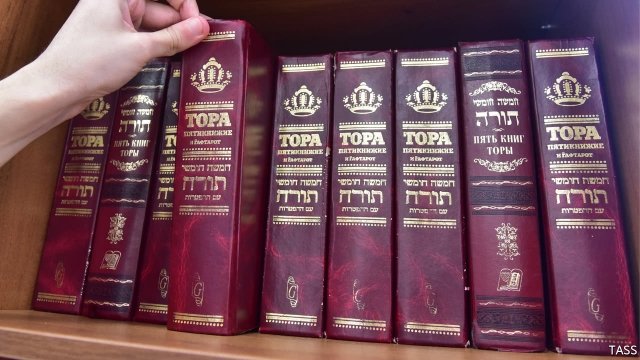So, this was a a roller-coaster week in relations between Judaism and Russian Orthodoxy. It started when one of the country’s best-known clerics, a man regarded as personally close to President Vladimir Putin, dropped a verbal bombshell while making an announcement about the hitherto mysterious workings of a church panel which is tasked with investigating the apparent remains of the last tsar and his family, killed by firing-squad in July 1918. “A large share of the church commission members have no doubt that the murder was ritual,” declared Bishop Tikhon Shevkunov.
Although he made no reference to Judaism, any historically-conscious Russian would instantly link the expression “ritual murder” with some of the darkest episodes in Jewish-Christian relations, in Russia and elsewhere, when anti-Semitic pogroms were triggered by absurd rumours that Jews had murdered Christians in order to use their blood for some ritual function. In the Russian empire, such craziness persisted until the very eve of the revolution: in 1913, a Jew called Mendel Beilis was put on trial in Kiev for “ritual murder” against a background of public hysteria whipped up by ultra-nationalist groups. A Catholic priest testified for the prosecution while Orthodox Christian theologians, along with Moscow's leading rabbis, spoke for the defence. Beilis was acquitted, but the case highlighted Russian anti-Semitism.
As might have been expected, the bishop’s odd use of words prompted strong protests from Jewish groups, in Moscow and beyond. A spokesman for Russia’s Federation of Jewish communities declared: “This [turn of phrase] comes across as absolute barbarism for a whole series of reasons.”
As news of the cleric’s words spread through the Western and Israeli media, Bishop Tikhon indignantly denied that there was anything anti-Semitic about the suggestion that the murder of the tsar and his family was a ritual killing. On the contrary, the slaying of the royals was a ritualistic act from the point of view not of any religion but of atheist, Bolshevik ideology. “The murder of the tsar and his family, putting the final stamp on the existence of the...300-year-old Romanov dynasty was a matter bearing very special, ritualistic, symbolic meaning for many,” as the bishop put it.Jewish leaders were somewhat reassured by this clarification but they stuck to their view that because of its loaded history, the use of the expression “ritual murder” had been unacceptable.
Meanwhile Mr Putin, even while cultivating a Russian nationalist ideology which often has an anti-Semitic edge, has hitherto been very careful to nip in the bud any open resurgence of anti-Jewish feeling. At one point, during recent arguments over the stewardship of St Isaac’s Cathedral in St Petersburg, advocates of handing the building over to the church began using anti-Semitic taunts against those who favoured keeping it as a state museum. But this line of argument was firmly slapped down by the government after Israeli and Jewish protests.
For at least 48 hours this week, after the bishop came out with his “ritual murder” remarks, it appeared that the taboo on using language offensive to Jews in high public places might have been lifted. His subsequent clarification (albeit unaccompanied by any hint of regret or contrition over the offence caused) helped to alleviate those worries.

But people will continue to watch very carefully what the Russian authorities, wordly and spiritual, do and say in the eight months leading up the 100th anniversary of the royal executions. The style of these commemorations will amount to a hugely important message about how the country’s current rulers view Russia’s past, and consequently about how they see the nation’s future. In the White Russian diaspora which kept the memory of the Romanovs alive, the story of the executions was often told with an anti-Semitic tinge. That helps to explain the startling effect of the bishop’s words.
Hi! I am a robot. I just upvoted you! I found similar content that readers might be interested in:
https://www.economist.com/blogs/erasmus/2017/12/judaism-and-russian-orthodoxy
Congratulations @ljupka! You received a personal award!
Click here to view your Board
Congratulations @ljupka! You received a personal award!
You can view your badges on your Steem Board and compare to others on the Steem Ranking
Vote for @Steemitboard as a witness to get one more award and increased upvotes!